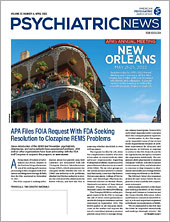As physicians are facing an inordinate amount of stress inflamed by COVID-19, several APA Annual Meeting sessions will address the alarming prevalence rates of burnout symptoms for both trainees and practicing physicians. Affecting both personal and professional domains, burnout may be associated with a decrease in professionalism, higher medical mistakes, substance use, and mood disorders. For psychiatrists, the APA Board of Trustees Workgroup on Psychiatrist Well-Being and Burnout found that 78% of respondents to an APA survey were at an increased risk of burnout, and 16% reported symptoms consistent with moderate to severe depression.
While a significant aspect of psychiatric clinical care was facilitated by telehealth technology, the pandemic nonetheless dramatically shifted the clinical and work culture for many psychiatrists. With the increased burden, psychiatrists reported higher prevalence of burnout symptoms during the pandemic (47% versus 42% in the previous year). In addition, psychiatrist participants in a survey conducted by Medscape earlier this year identified the high volume of bureaucratic/nonclinical tasks, long work hours, and the lack of respect as the top three contributing factors to their burnout symptoms.
Consistent throughout many studies, female psychiatrists were significantly more likely to report burnout and depressive symptoms in comparison with their male colleagues. For female psychiatrists, potential factors adding to burnout may be social expectations of child care, higher demands of work-home balance, and gender-related discriminations. Similarly, sexual minority medical students were eight times more likely to report burnout in comparison with their heterosexual counterparts due to perceived hostile environment, mistreatments, and discrimination. However, for ethnic and racial minorities, the varying and sometimes contradictory results highlight the multifactorial complexity of examining burnout—ranging from fewer burnout symptoms and increased rates of burnout to no significant difference in burnout rates compared with White peers. A systematic review of 16 studies similarly found inconclusive differences among ethnic and racial minorities and their nonminority peers, which may be related to variations between the two groups or other covariates (for example, socioeconomic status and specialty).
Highlighted by presentations at the APA Annual Meeting, the increased burnout in female and underrepresented trainees and physicians needs individualized examination and solutions. With the recently galvanized national attention toward diversity, equity, and inclusion issues, more in-depth studies on physician burnout are needed on women, sexual minorities, and ethnic and racial minorities. For minority physicians, compounding factors, such as interpersonal microaggressions and individual or structural discriminations, may pose as additional stressors to burnout.
The proposed solutions to burnout have ranged from individual-level changes (for example, building resilience, yoga, and meditation) to system-level changes (for example, reducing administrative burden, increasing time available for patient care, and promoting team-based work). It is important to note that while resilience may be inversely correlated with burnout, one study found that physicians with the highest resilient scores still demonstrated substantial burnout symptoms. Furthermore, there is a dearth of research targeting burnout solutions in minority and marginalized physicians, especially in the intersectional dimensions. With COVID-19 fueling the current “Great Resignation,” system leaders and health care organizations tackling burnout must address physicians’ physical and emotional depletion, restore the core connection to the work, and reestablish a sense of trust in the workplace—all of which require more than just yoga. ■
The titles and schedule of Annual Meeting sessions on physician wellness and burnout can be accessed at the meeting’s Session Search tool
here.


